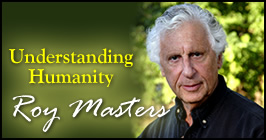By
Roy Masters
May 16, 2011
NewsWithViews.com
[A selection from Hypnotic States of Americans Just Released! Available on Amazon.com]
Born in London in 1928 of Jewish heritage, I grew up during the Second World War and knew that members of my extended family were murdered in the Holocaust. The puzzlement at how this could happen affected me from my earliest years.
How could an otherwise civilized society like Germany become so completely immersed in what appeared to be a madman leading a nation in a trance? This was no ordinary madness; trains ran on time, children went to school, the opera performed—the veneer of patriotic normalcy was everywhere and yet the people fought to the death for the beast from the pit. Hitler might have enveloped the entire world had he and his minions not been conquered by force—and recall that beating him was very difficult even with the combined efforts of the most powerful countries in the world. How could the German people ignore or allow the atrocities taking place directly in front of them?
That puzzle was resolved for me with jaw-dropping clarity when, in the early 1940s, I saw a stage hypnotist induce people to do crazy and irrational things on an individual level, much as Hitler’s Germany had accomplished on a national level, albeit with much more evil consequences. (As I would later discover, the oft-repeated notion that people cannot be hypnotized to think and act against their own conscience is utterly untrue.)
Always a seeking young man, my interest was profoundly sparked by that stage demonstration. I thought, “Why can’t this power be used to make people behave in rational instead of irrational ways?” It was many years before I discovered that life itself exerted hypnotic influences, and that hypnotic pressures were the principal cause of almost all the world’s sufferings. The answer, then, did not lie in fighting hypnosis with more hypnosis—adding additional layers of conditioning on top of what was already there, but in finding a way to become progressively dehypnotized and less susceptible to the hypnotic effects of one’s formative years.
Countless others have studied this problem, including many profound figures in the history of religion. One of the most useful studies is Battle for the Mind, by William Sargant, first published in 1957. In addition to describing techniques of religious conversion, prisoner interrogation, political indoctrination, psychotherapy, and the effect of severe stress situations like combat, Sargant emphasized how suggestible people become when caught up in states of anger, fear, or exultation—and how they can be manipulated once such states are begun and sustained.
There just had to be some kind of counter-hypnotic system, I pondered as a young man, perhaps what religious people called faith, or listening to one’s conscience, necessitating no other lawgiver. Something common to all humanity just had to be the guiding light and the “lamp unto our feet.” However, this being so, how did we get lost and how might we be found again? It didn’t take me long to realize that there were powerful religious and political forces that never wanted us to find that kind of freedom from the power they have held for thousands of years. Most puzzling was that entangled people tended to be loyal to their corrupters. Like dope addicts with their pushers, most people held fast to their systems, stubbornly defending what they thought of as themselves, which was in reality a childhood conditioning programmed into them practically from birth.
So, in the late 1950s, after many years of using my growing knowledge about hypnosis to help people, I made three important discoveries that have guided all my subsequent work.
The first core discovery was that the root of human problems is that we are already hypnotized and hypnotizable to varying degrees. Many well-meaning people in the past who came to this realization in some way had tried to help others by fighting hypnosis with hypnosis—further hypnotizing them into a better set of core beliefs and behaviors—perhaps by converting them hypnotically to a set of religious, ethical or political beliefs or practices that would improve their lives. I further realized, however, that wicked people who sensed this weakness in people had applied hypnotic techniques to make others serve their selfish ends for power, money or fame—with no intention of helping them ever become free.
Even converting someone hypnotically to a better set of beliefs and practices was not enough, because so long as people remained hypnotized, they would also remain hypnotizable. So another person with hypnotic skill could come along later and convert them to a very dangerous and unhappy set of beliefs and practices and lead them into disaster—as Hitler did to the German people, Stalin did to the Russian people, and as many governments and leaders are doing presently.
So, my second important realization was that the fundamental cure to all of this was not further hypnosis. Instead, I had to discover a way to help people become de-hypnotized and less susceptible to life’s ongoing hypnotic influences. Only thus could I help people to become truly free—even free of any need for me or any other helper once they had been set free from their hypnotic states and equipped with the tools to avoid being hypnotized again.
My third crucial realization came as I explored means to de-hypnotize people and help them become less suggestible. I realized that what is at the root of virtually all of our emotional problems, including our suggestibility and therefore our inability to truly be ourselves, is none other than our own resentment-much of it buried.
I realized at a young age why so many Germans during World War II were like those subjects on the hypnotist’s stage, living in pre-existing hypnotic states since childhood. Various authorities held the keys to quivering minds; they alone could reach inside to reawaken and reinforce implanted identities. Identity reassurance in exchange for submission had to be the reason why so many fight to the death for the strongest force. The core of authoritarian power had to be child abuse, but not necessarily the violent or criminally punished kind, as you will see.
| Subscribe to the NewsWithViews Daily News Alerts! |
In 1991, I re-published the booklet, Brainwashing: A Synthesis of the Russian Textbook of Psychopolitics. In this devastating 1930s account, it is clear that Russia, just like Germany, knew the evil art of subduing the mind. Shadow governments are preceded by an epidemic of personal and public defamations of noble heroes, demoralization of the youth leading to irresponsible parenting, relationships and unwanted children. An atmosphere of fear, uncertainty and strategic shocks will keep people in line no matter how old they become. Maturity rarely outgrows such conditioning. In fact, seeing and struggling with it can cause a hopeless depression and/or an ultimate decision to side with the bully.
� 2011 Roy Masters - All Rights Reserved
Sign Up For Free E-Mail Alerts
Roy Masters—who in his 80s continues to broadcast the longest-running counseling show in talk radio history, his internationally syndicated daily radio program Advice Line, grew up in pre-WWII England. He started his journey toward understanding human nature when as a teen he saw a stage hypnotist at a vaudeville show in Brighton. The hypnotist easily put volunteer subjects in a spell and made them do outlandish things, like dancing with a broom and forgetting their own names.
Puzzled by the hypnotist’s mysterious power, Roy distinctly remembers pondering the question: “Why can’t hypnotism be used to make people act sensibly, rather than foolishly?” Inspired by the idea of harnessing this baffling force for good, he later pursued the art of hypnotism and established a successful hypnotherapy practice.
After several years of practice, Masters made his central and pivotal discovery about the root of people’s emotional problems, addictions and complexes. He realized that people did not need hypnosis, because their core problem was that they are already hypnotized—not by a clever stage performer, but by the stresses, pressures and seductions of daily life.
He used his knowledge to discover a way to help us become de-hypnotized, and discovered that the root of the power of negative suggestion lay in our wrong emotional response, that of resentment. Masters’ remarkably effective exercise, a simple observation technique called Be Still and Know—is at the core of his unmatched track record in helping people overcome even the most serious mental-emotional problems, and is the centerpiece of a successful program within the U.S. military community (“Patriot Outreach”) that is helping thousands of military personnel and their families cope with post-traumatic stress disorder (PTSD).
Website: www.fhu.com











 Share
This Article
Share
This Article





